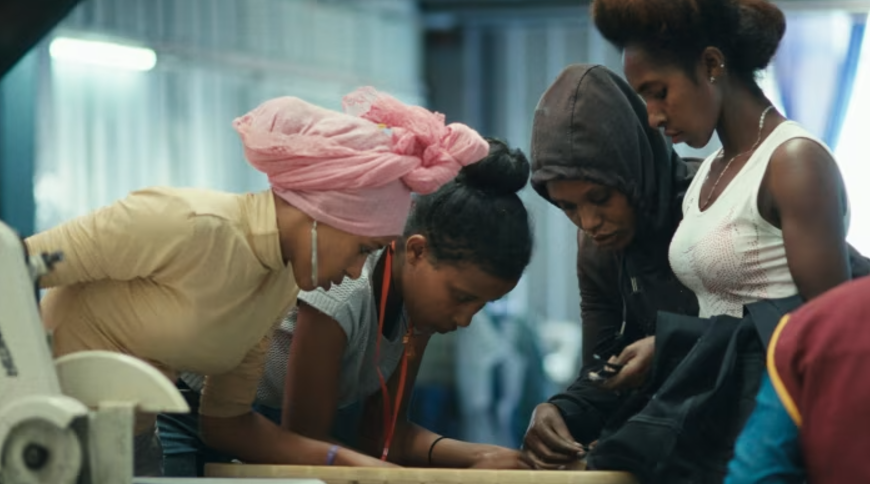In 1984, Ethiopia was thrust into global awareness due to a devastating famine that sparked a massive humanitarian response, epitomized by the Band Aid single, Do They Know It’s Christmas?. Decades later, the country finds itself the focus of a very different narrative. The documentary Made in Ethiopia offers a captivating exploration of Ethiopia’s present, where Chinese investments and infrastructure projects promise transformation but also raise complex questions about development, tradition, and global influence.
The documentary, directed by Max Duncan and Xinyan Yu, takes us into the heart of Ethiopia’s evolving relationship with China. It zooms in on the Eastern Industrial Park, located in Dukem, a small farming town just outside the capital, Addis Ababa. This industrial hub is a key part of China’s Belt and Road Initiative, a global development strategy designed to expand trade networks and economic influence. For Ethiopia, the park symbolizes an ambitious leap toward modernization and industrialization. For the Chinese investors, it represents a prime opportunity to tap into affordable land and labor markets.
A Wedding Scene That Sets the Stage
The film begins in 2019 with a scene that captures the intertwining of these two cultures: a wedding between a Chinese groom and an Ethiopian bride. The exchange of a cash dowry introduces a literal transaction that mirrors the economic exchanges shaping the region. From this starting point, the film dives into the aspirations and challenges of building an industrial hub that some hope will transform Dukem into a “new Dubai.”
The Promises of Development
The documentary highlights the optimism driving these efforts. Ethiopian officials are eager to attract foreign investment, hoping it will create jobs in a country where nearly half the population is under 18. For their Chinese counterparts, Ethiopia offers not only affordable resources but also an opportunity to expand their global economic footprint.
Among the film’s key figures is Motto Ma, the cheerful and determined director of the industrial park. Ma exudes confidence, proclaiming the venture a “win-win-win” situation. Her optimism extends beyond economics to the workers whose lives she believes will be transformed. One such worker is Beti Ashenafi, a young Ethiopian woman introduced wearing Nike earrings as she toils in a shoe factory. For Beti, the industrial park represents a chance to participate in the global economy, though the film doesn’t shy away from questioning whether the benefits trickle down equitably.
A Four-Year Journey
The filmmakers spent four years documenting the story of the industrial park, allowing viewers to witness the evolution of this ambitious project. While 91 minutes is hardly enough to capture every detail, the documentary manages to provide a broad yet detailed snapshot of the challenges and opportunities. It portrays the aspirations of the Ethiopian government and Chinese investors but also sheds light on the uneven outcomes and frustrations that accompany such ventures.
The Human Cost of Progress
One of the most striking elements of Made in Ethiopia is its focus on the lives of ordinary Ethiopians. The film explores the plight of local farmers who have lost their land to make way for the industrial park. Promised compensation often remains elusive, leaving these families struggling to adapt to their new reality. For many older residents of Dukem, the rapid pace of change feels alienating, eroding traditions and leaving them in a “grey zone” of cultural dislocation.
The film also touches on the perspective of Chinese factory managers, some of whom see Ethiopia as a reminder of China’s own developmental past. One manager likens the country to what China was in the 1980s, reflecting on a mix of nostalgia and opportunity. This observation hints at the broader historical arc of industrialization and the parallels between Ethiopia’s current journey and China’s rise over the past few decades.
A Study in Contrasts
Despite its tight runtime, Made in Ethiopia manages to delve into the contrasts that define the industrial park. It juxtaposes the enthusiasm of individuals like Motto Ma with the frustrations of those left behind in the race toward progress. Ma’s outsized personality often takes center stage, symbolizing the imbalance in power dynamics between foreign investors and local stakeholders. Yet the film also gives voice to Ethiopians, providing a nuanced view of how this grand project affects individuals at different levels of society.
The documentary doesn’t attempt to answer all the questions it raises. Instead, it presents a layered portrait of a community in flux, leaving viewers to ponder the broader implications of Chinese investment in Africa. How do projects like the Eastern Industrial Park reshape local economies and societies? Do they truly deliver the “win-win-win” results that investors promise? Or do they exacerbate existing inequalities while creating new ones?
A Reflection on Globalization
At its core, Made in Ethiopia is a meditation on globalization and its impact on the developing world. The film underscores the complexities of balancing economic growth with cultural preservation and equitable development. It doesn’t shy away from highlighting the challenges and contradictions inherent in these partnerships, making it a thought-provoking watch for anyone interested in the dynamics of international investment.
As Ethiopia continues to navigate its path forward, the Eastern Industrial Park stands as a microcosm of the opportunities and pitfalls of modern development. Made in Ethiopia captures this moment in time with sensitivity and insight, offering viewers a window into the lives of those at the intersection of global ambitions and local realities.






